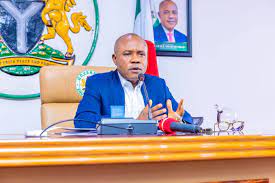The Non-Academic Staff Union of Educational and Associated Institutions (NASUEAI) Thursday asked the National Assembly to include its members in the proposed bill on Harmonised Retirement Age for Teachers .
This was contained in a letter submitted to the National Assembly through the Senator representing Oyo Central senatorial district, Senator Teslim Folarin, by the union leadership in Oyo state on behalf of others in the 36 states and the FCT.
In the letter signed by the Oyo state NASUEAI chairperson, Comrade M.A Adediran, the union pleaded with Senator Folarin to speak in support of the inclusion of non-teaching staff when the bill is finally transmitted to the red chamber by the Federal Ministry of Education for enactment.
Alleging that the Federal Executive Council is seen to be discriminatory against the non-teaching professionals and support staff in the basic education sub-sector, it stated that: “The NASUEAI members must be included in the proposed executive bill in the spirit of fairness, equity, natural justice and good conscience. Teachers are not the only workers in the basic and foundational sub-sector of the education sector. Teachers work with quite a diverse range of non-teaching professionals and support personnel.
” While we conceded that teaching is central to schools, it is also obvious that a positive, congenial, safe and healthy working environment conducive for teaching and learning is also important, which teachers alone cannot provide and guarantee”, it said.
The union added, “We did draw the attention of the president and the Honourable Minister of Education, to the discriminatory aspect of the policy and pleaded that the interest of the non-teaching professionals as well as those of other support staff of the sub-sector should be taken into consideration in the policy direction of government.”
NASUEAI added that: “The National Assembly, as the highest representative body of the people, and the holder of constitutional and legislative power of broad oversight functions, is empowered to scrutinise bills and the conduct of government officials.”




